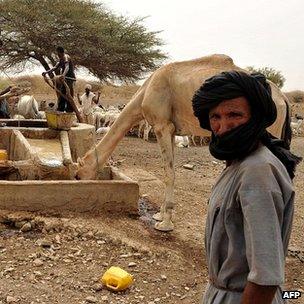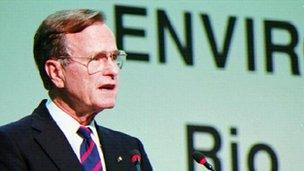The joylessness of shopping
- Published
- comments

Leo Johnson says shopping doesn't make us happy
Somewhat in the manner of a therapist directing his patient towards a profound inner truth, Leo Johnson asked us to close our eyes and recall a time and a place when we we'd been "totally in the groove, really happy".
We did.
Then, he asked how many of us had found that totally groovy happy experience when we'd been shopping.
As far as I could see, no hands went up.
"We've been living a big fat lie," he said. "We know that consumption doesn't make happy lives."
The "green" message, he said, wasn't best expressed as "self-flagellation", about having less; but about "having more of the stuff we care about".
The event at which Mr Johnson was speaking, external was one of many that have been held in London over the past few months in the run-up to the Rio+20 summit, external, which is now less than a month away.
This one was convened by the UK parliament's Environmental Audit Committee (EAC), external and the Hard Rain project, external, which documents environmental and social issues through photography.
Several hunded people went along; and like others I've been to, the mood of speakers and audience was an amalgam of Obama-style "yes we can" and austerity-era "I'm afraid we won't".
And that's quite rational. Anyone aware of what the UK's chief science adviser Sir John Beddington a few years back termed "the perfect storm, external" of population growth - growing demand for food and other resources, and environmental factors such as climate change - must logically be optimistic that Rio+20 will do something to change humanity's unsustainable trajectory. The signals coming from the preparatory talks, however, suggest it'll be a wiggle rather than a volte-face.

In some poor countries, water supplies are being affected by businesses supplying export goods
While much of the Rio agenda focuses on the developing world and people's rights to water, food, energy, education, health and so on, there are implications for rich Western countries as well.
The link is obvious. For example: if a company somewhere in Africa chops down a forest to grow food destined for Europe, and that deforestation wrecks the water supply used by villagers, who's to blame - the Africans or the Europeans?
Hence the notion of sustainable consumption.
As photographer Mark Edwards, a founder of Hard Rain, put it at the EAC event: "We have to change our minds, from wanting as much as we can get of everything to wanting the right amount."
Understandably, not everyone is keen on agreeing measures on sustainable consumption, in Rio or elsewhere.
It smacks to many of the "self-flagellation" of which Leo Johnson spoke; it smacks of interference in people's freedom to spend their hard-earned cash as they choose.
And in these economically straitened times, there's a conflict with the way many politicians and businessmen see the immediate future and the need to "grow" our way out of recession.
Statements such as "we need to boost demand" rarely carry caveats saying that demand (and the resulting consumption) should be "sustainable", or should take note of ecological concerns, or be equitable.
I couldn't help wondering whether this conflict plays itself out in the Johnson household when they convene for a family dinner, with Leo - founder of Sustainable Finance, external and a partner with accountancy giants PwC, external in sustainability and climate change - at one end of the table, and his brother Boris, external, Mayor of London and a potential future Conservative Party leader, at the other.
Does Boris tells everyone how great the beef is to stimulate demand, while Leo takes a small portion and urges sustainable consumption?
You might think that's a trivialisation of the issue; but it encapsulates the dilemma facing those Western politicians who care about the developing and natural worlds while also battling recession.
In the very early days of preparations for Rio, the idea of discussing sustainable consumption was mooted, even leading to the notion of setting sustainable consumption goals.

President George Bush told the 1992 Rio summit that the American way of life was not negotiable
That didn't win through as a separate entity, though it's still implicitly alive in the form of sustainable development goals (SDGs), external.
The idea is that these would come into play around 2015, the target date for most of the existing Millennium Development Goals (MDGs), external; but unlike the MDGs, they would be relevant to every country, not just poorer ones.
For these goals to be meaningful and comprehensive, many would argue they have to cover consumption patterns in rich nations.
Yet reducing consumption means reducing growth; so would politicians go for it?
One way of squaring the circle would be to measure economic output (and therefore growth) in terms other than simple GDP.
This would mean taking "natural capital", the services that nature provides for free, into the equation; but it would also mean being more acute about distinguishing where and how growth occurs.
As a briefing document for another pre-Rio event this week put it: "Increased consumption by those whose basic needs are not met would be considered progress by most.
"On the other hand, increasing the competitive consumption of luxury goods among the rich would only be considered progress by a few."
Leo Johnson put it another way, talking of capitalism that did not pursue "the American dream where you serve the same billion people nine times... rather, you serve the nine billion once or twice."
And Claire Foster-Gilbert, a former advisor to the Archbishop of Canterbury and founder of the Ethics Academy, external, had a blunter take: "Could we devise a model of society that did not depend on us becoming ill with our fatness?"
These models exist already - in books, academic papers and the imaginations of many planning to take the road to Rio.
The bigger issue is whether Western governments will choose to bring them into reality.